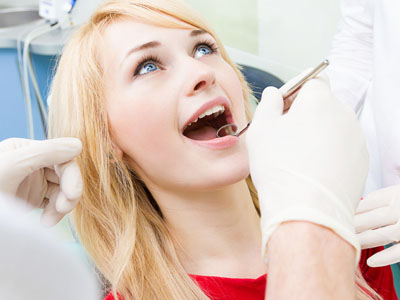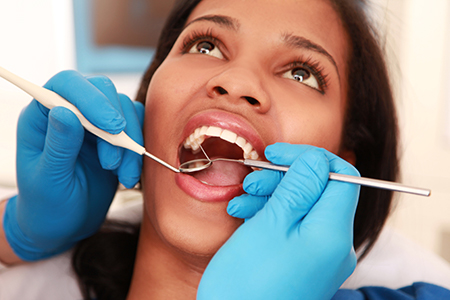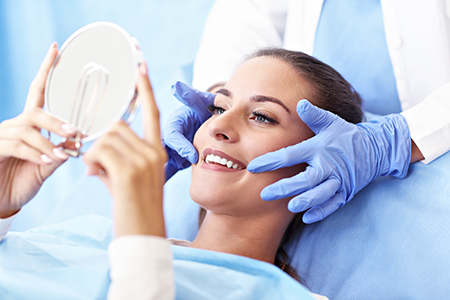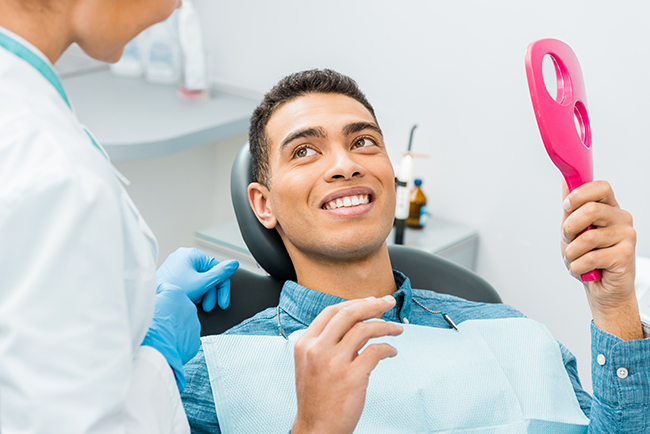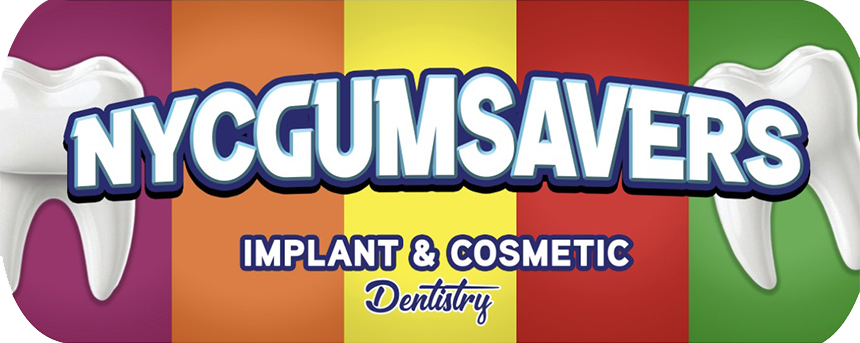At the office of Kramer and Kramer Dental, we emphasize taking a proactive approach as the best way to maintain a healthy,
beautiful smile. By coming to our office as recommended for checkup visits and routine care, we can help you and
every member of your family prevent the onset and progression of many oral health problems. As skilled and
experienced providers of care, we offer a comprehensive range of preventive services, including examinations,
professional teeth cleanings, and oral cancer screenings, along with patient
education on hygiene, diet, and healthy practices.
What Happens at the First Checkup Visit?
Your first visit to our office establishes your oral health baseline and provides essential information on your
dental interests and needs. We begin by carefully reviewing your medical and dental histories and taking special
note of all of your dental concerns, as well as any symptoms that you may be experiencing. This initial conversation
is followed by a thorough clinical examination, including an oral cancer screening,
periodontal evaluation, and an analysis of your occlusion (bite).
To perform a comprehensive oral exam, we'll recommend and take diagnostic films as needed. As we take a close look
at your smile, we'll examine your teeth, the supporting bone and soft tissues, and the surrounding areas of the
mouth, head, and neck. We'll make a note of any signs of clenching or grinding your teeth and assess your TMJ
(temporomandibular joint) function. A comprehensive oral exam can also reveal the consequences that certain
dietary choices, eating disorders, medications, harmful habits, and inadequate oral hygiene practices may have on
your smile.
We want every patient to enjoy the benefits of a healthy and beautiful smile. At the office of Kramer and Kramer Dental, you
can rest assured that your oral exam is performed with the utmost care and that every member of our team is
sensitive to your needs. Based on your oral exam findings and what we see on your diagnostic films, we'll outline
what further treatment, if any, may be needed and discuss all your options in care.
A Healthy Smile is Vital to Your Overall Well-Being
At the office of Kramer and Kramer Dental, we recognize that a healthy smile is more than just an attractive asset; it is
also essential to one's overall well-being. Harmful conditions affecting your teeth, gums, jaws, and structures in
and around the oral cavity can impact your overall well-being. As we perform an oral exam and check for the
development of common dental conditions such as tooth decay or gum disease and screen for oral
cancer, we also take note of any signs of problematic health issues that may have originated
elsewhere in the body.
Today, researchers are establishing more and more links between poor oral health and systemic disease. Mounting
evidence supports the idea that dental disease contributes to a range of health issues, including the following
conditions:
-
Digestive disorders
-
Respiratory Problems
-
Cardiovascular Disease
-
Stroke
-
Diabetes
-
Alzheimer's Disease
The reverse is also true. Just as oral health problems can be linked to systemic illnesses, diseases in the body can
likewise produce oral health issues. According to statistics, more than 90% of all systemic diseases (conditions
affecting organs and systems in the body) can manifest signs and symptoms in the oral cavity. Experiencing dry
mouth, bad breath, gum problems, ulcerations, or other oral lesions may be indicative of an underlying medical
condition.
The Importance of Routine Checkups and Professional Dental Cleanings
Enjoying a smile that looks good and functions at its best is not something you can take for granted. To maintain
optimal oral health and a vibrant smile requires an effective dental hygiene regimen, a nutritious diet, routine
checkups, professional cleanings, and a comprehensive program of preventive care.
Remember, it's important not to hold off seeing the dentist until you're in terrible pain or think there's something
wrong. By scheduling a routine appointment for a comprehensive dental checkup and professional cleaning, we can help
you keep your smile looking and functioning at its very best.
Our office encourages patients to come in twice a year for routine checkups and professional cleanings. In this way,
we can monitor your oral health, reduce your risk of dental disease, and detect any issues early in their onset when
they are typically the simplest to treat.
While maintaining a healthy smile depends upon keeping your teeth and gums clean at home, even for the best
"brushers" and "flossers," it's difficult to reach every nook and cranny between the teeth and gums. For this
reason, we emphasize the importance of professional teeth cleanings. In this way, our hygienist can thoroughly
remove any accumulated plaque and tartar from between the teeth and gums, including areas that you may have missed.
Since dental plaque harbors the bacteria that are responsible for cavities and gum disease, its removal prevents
these disease processes from occurring. Following a dental cleaning and polishing to remove any superficial stains
from your teeth, your mouth will feel fresh and clean.
Checkup and cleaning visits also represent an opportunity to educate patients in the best oral hygiene homecare
methods and routines to maintain a healthy smile. As your trusted partner in care, we'll carefully explain and
demonstrate the proper techniques for brushing, flossing, and other healthy oral care practices.
Even though proper dental care is essential at every stage of life, it's especially important for children to
establish a strong foundation for a lifetime of oral health. With routine checkups, preventive treatment, and
age-appropriate education in the best methods for taking care of their teeth, we can help your little ones protect
their smiles from dental disease. We also monitor your children's dental and jaw development as they grow; keeping a
close watch to determine if any orthodontic intervention will be needed to align
their smiles.
Our goal is to help you and every member of your family establish healthy practices that will last a lifetime. At the
office of Kramer and Kramer Dental, we're proud of the reputation we've established for providing skilled and compassionate
care. We work hard to make every visit to our office a positive experience while building long-standing
relationships with our patients and achieving outstanding treatment outcomes.
What Do Dental X-Rays Show?
Although we perform a thorough visual inspection of every aspect of your smile, the only way to see the deeper
structures of the teeth, as well as the surrounding tissues and bone, is with dental x-rays
or radiographs. Diagnostic x-rays not only reveal the presence of dental disease, but they
also provide valuable information on the development, health, and integrity of teeth and orofacial structures.
Thanks to advances in technology, x-rays have entered the digital age. Instead of using traditional film-based
methods, which involved long-exposure times and developing solutions, digital x-ray images can now be acquired,
stored, and managed via digital sensors and integrated software programs.
Digital radiography offers several benefits to the patient, including
the following:
-
Quicker with minimal exposure to x-ray radiation
-
Images can be viewed immediately after acquisition
-
Images can be electronically shared
-
Digital radiographs do not require any developing chemicals, create less waste, and are safer for the environment
-
Images are immediately stored in the patient's electronic file, where they can be easily viewed on a screen, shared, or printed out.
What Are the Different Types of Dental X-Rays?
The type of diagnostic images our office will recommend depends on the nature of your visit and your oral healthcare
needs.
Here's a list of some of the most common diagnostic films and the value of these images:
-
Periapical x-ray - This small film is typically taken of an individual tooth and provides a view of the entire tooth from the top of the crown to the tip of the root and bone adjacent to it.
-
Bitewing x-ray - This small film captures detailed views of the crowns of the premolars or molars and is typically used to check for dental decay.
-
Full Mouth Series - This set of x-rays consists of bitewing and periapical views of all the teeth.
-
Panoramic Film (panorex) - This film provides a 2D panoramic view of all the teeth and the left and right sides of the jaw. It offers a view of erupted teeth, developing teeth, impacted teeth, and allows an assessment of the health and integrity of the jawbone.
-
Cephalometric Film - This film provides a profile view of the face and jaws and is often used by orthodontists to assess a patient's skeletal facial and jaw growth.
Today, it's also possible to capture detailed three-dimensional images for diagnostic purposes, treatment planning,
and the delivery of care. By using Cone-beam computed tomography (CBCT) your dentist can acquire,
analyze, and reconstruct 3D images of a patient's teeth, jaws, and surrounding anatomy. This technology is often
employed for diagnosis, surgical planning, treatment, and the accurate placement of dental
implants.
